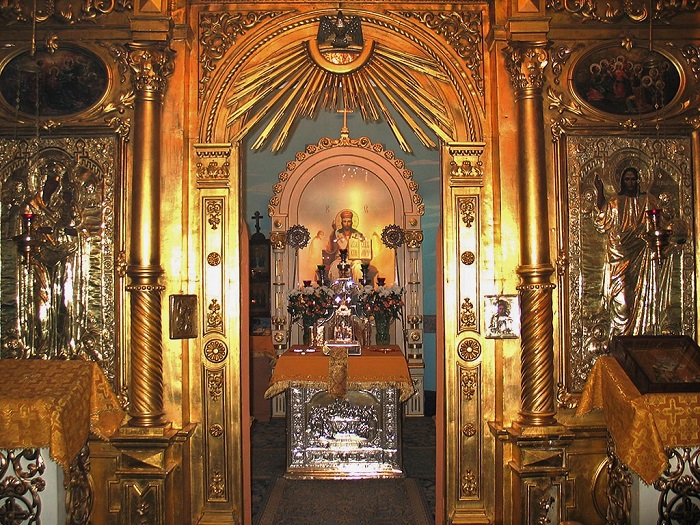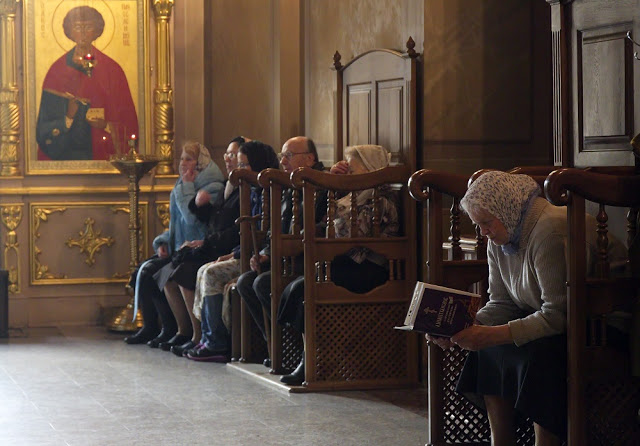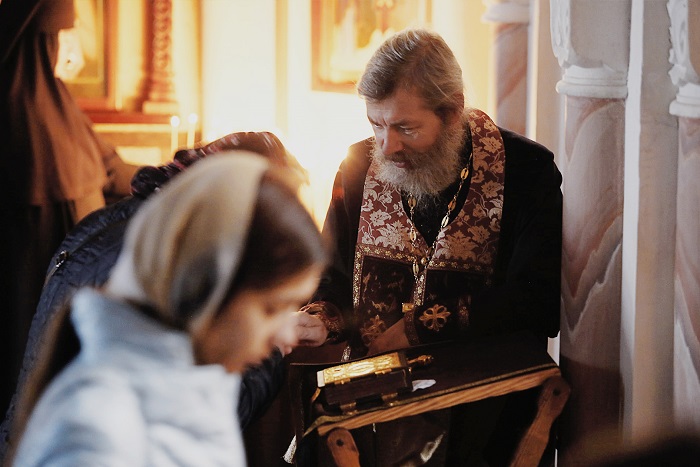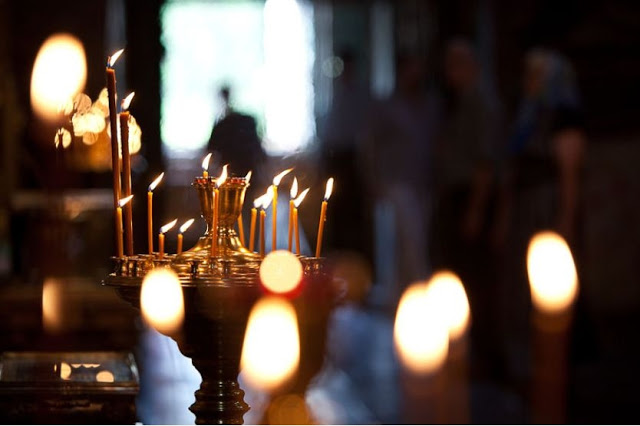
Why do priests keep women out of the altar? Why are there places in the church that are forbidden for women? Is a woman worse than a man? – Archimandrite Alipius (Svetlichny) answers.
In the eyes of the Church, a woman is not unclean at all, as some people with liberal attitudes suspect. Otherwise, the Church would not praise the Virgin Mary so much! She would not honor the multitude of holy women and virgins.
Moreover, there is no significant difference between a man and a woman, a layperson and a priest in moral theology. Theology recognizes that we all are human beings! There are people who seek salvation, and people who condemn themselves to perdition. This is the only distinction.
In his interpretation of the 15th Rule of the Council of Chalcedon, Balsamon writes: “What is said in the given rule is completely out of use; for nowadays they do not ordain the deaconesses, although some ascetic women might be called deaconesses albeit not in the proper sense; because there is a rule which determines that women should not enter the holy altar. So, the one who cannot enter the holy altar, how will she perform the deacons’ functions?” And that’s where we stumble! It turns out that there is a rule that determines that women should not enter the altar… Looks like discrimination begins…
Let’s find that rule to understand why women shouldn’t go into the holy altar.

Let us turn to the Syntagma and look at Chapter 22, “That Women Should Not Enter The Holy Altar.” We read: “The 44th Rule of the Council of Laodicea considers it inappropriate for women to have access to the holy altar, even though they had previously been allowed to do so. For if lay men are forbidden to do so (69th rule of the 6th Ecumenical Council), the more so should women [be forbidden]. Women are not allowed [in the holy altar], as some say, for reasons of their involuntary monthly period.”
So here is the problem! It turns out that lay men are also banned from entering the altar! This is what the 69th Rule of the Sixth Ecumenical Council says: “Let no one of the laymen be allowed to enter the holy altar. Yet according to some ancient custom, it is not forbidden to royal power and dignity when the emperor wishes to bring gifts to the Creator.”
Thus, only the king may enter the altar because he is anointed, and only when he brings a gift, i. e., a royal ritual gift to the church.
Let’s try to understand why the rule doesn’t let lay people in the altar.
I don’t think we need to look for any clarification, because it is clear enough! The sanctuary is meant to be a place of divine service. It was separated from the rest of the church so that the place might not only be sacred, but also so as to prevent disorder and tumult that often occurs when there are too many people in the church, especially on holidays.
The altar should be the place of deep prayer and exceptional order. This is especially important, since the Holy Chalice with the Blood of God is on the holy table! The Lamb of God in the form of the Bread is on the table! There must be no room for negligence in the altar. Rather, it is the place for awe and reverence in all things.

If the lay people were to enter the altar, it would become a passageway, and soon enough, disorder and nuisance would ensue.
Nowadays we can see how often laymen harass priests who come out of the altar for some reason. Everyone needs to say something, ask a question, hand a note with a lot of explanations to the priest or even give him a gift, or sometimes comment or complain with indignation. Some people try to start their own customs at the place where they stand… Imagine what that kind of hubbub would look like in the altar!
Therefore, the wise decision of the Holy Fathers was that only those who serve the Holy Sacraments should be in the altar.
Nevertheless, time has made changes to the provisions laid down by the Councils, and today we can see some lay people in the altar. What are they doing there?
Are they idling around? No, they perform some duties there. Kormchaia Book requires a priest never to begin the Liturgy unless he has an acolyte at his disposal.
Then we suddenly encounter another strange thing: you can see nuns in the altar in convents! They are allowed to enter the altar for the same purpose: they assist the priest during the service.
Therefore, the Church doesn’t consider women inferior to men.
There has to be moderation in all matters, and there has to be reason and order in the Church of God.
Translated by The Catalog of Good Deeds




Glad to read this explanation. Mind, I still think women should be allowed to serve at altar, but at least I understand better why it doesn’t happen. Far too often in online discussion groups, some men like to really lord it over the women and make it out like because women have menstrual periods that’s somehow shameful and inately sinful, that’s why the restriction. They tend to conveniently overlook the fact that the average layman isn’t allowed at the altar either unless they are officially servers. So naturally, when something is put in a way that tries to make someone else seem “less than” other folks will want to challenge that kind of sexist pridefulness…but then that all gets distorted and next thing you know, no one knows the actual teaching and there’s nothing but fighting and stubbornness! It’s nice to see a place like this where it’s all laid out in front of a person so they can see all of the truth without pre-conceived notions and prejudices or shaming involved. Thank you.
Hello Sabrina. Women do not need to serve at the altar in order to serve the church. I have included a link to a video about the female diaconate I hope you’ll watch. https://www.youtube.com/watch?v=6pPU4hhcM64
As you know, this is a very important topic for many. Can you please provide a fuller answer? In one place you correctly state that women are not unclean, but then later you state they are barred from the altar because of their monthly periods. If they are clean, then why should a biological necessity preclude them from being deaconesses as in ancient times?
Not 100 percent sure of this Dimitri but from my understanding a woman could not become a Deaconess until she was past childbearing age, generally age 40 or 50, so perhaps menstruation wasn’t an issue at that point?
Sometimes ya gotta vacuum. But not when anything is going on. True story.
I believe this also. I have been told, as a child that even the Virgin Mary was not allowed in church when she reached the age of 12. An older woman, who is widowed and way past her menstrual age is allowed in the alter to clean.
In my feeling, the Holy altar should be for everyone to experience and witness as long as its with reverence and respect. In my eyes, this article seems to be one that is to pacify people’s questioning, and another excuse for exclusive patriarchal power. I’m sure these issues are coming up in the church with the “me too” movement.
I hope someday the church can change its out dated societal traditions which exclude anyone from anything, including being a priest/ess or deacon/ness if one feels called. I believe this can be updated while also preserving the ancient Holy traditions of the church. I hope both can exist! With LOVE. – Audah Danielle
These are not outdated and societal traditions in the least. Patriarchal power is a positive thing, not a negative. How can we preserve the ancient Holy traditions of the Church while simultaneously giving into the whims of the modern secular age? This is the same path both Protestantism and Roman Catholicism have gone down. Thank our Lord and Savior that young people are waking up to the destructive mentality of throwing away our faith because it does not align with the spirit of the age.
It has good reason. Form canonical books i read
In the new testimony when Feby was giving sermons out of 100 men hearing her sermon 80 wanted her. By nature weomen have beautifully voice so it will distruct many instead of focusing on the words of God they will focus on the beauty of the voice. Same goes for covering their hair. It a place of worship. So to avoid any temptation this rule where given to us for our own good.